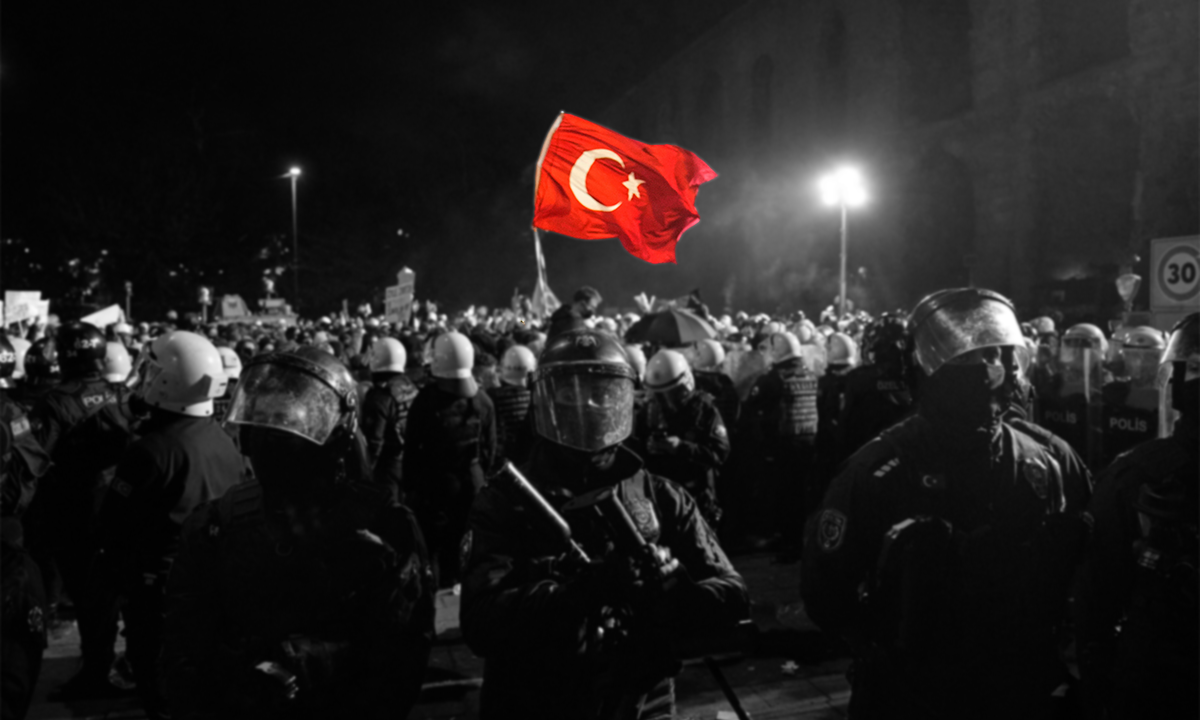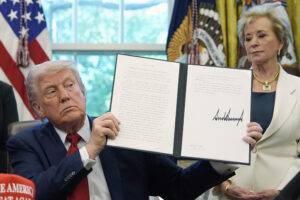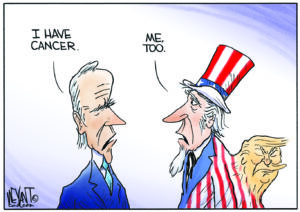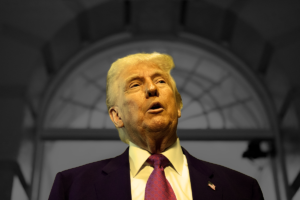The End of Erdoğan?
Dissident author Ece Temelkuran talks about the protests rocking Turkey and the state of autocracy around the world. Turkish police take positions during a protest on March 24, 2025, after Istanbul's Mayor Ekrem Imamoglu was arrested. (Graphic by Truthdig. Image: AP Photo/Khalil Hamra)
Turkish police take positions during a protest on March 24, 2025, after Istanbul's Mayor Ekrem Imamoglu was arrested. (Graphic by Truthdig. Image: AP Photo/Khalil Hamra)
In 2019, when Ece Temelkuran published “How to Lose a Country: The Seven Steps from Democracy to Dictatorship,” she was called a Cassandra. Six years on, the veteran Turkish dissident is more likely to be seen as a prophet. Nowhere is this truer than in her native country, where on March 19, the authoritarian president Tayyip Erdoğan arrested his political rival, the charismatic mayor of Istanbul, Ekrem İmamoğlu, on false charges of terrorism. That proved to be the breaking point in a nation already overflowing with resentment and frustration. For more than a month, the streets of Turkish cities have seen massive weekly protests challenging the president and his routine breaches of democratic norms.
I recently spoke with Temelkuran over Zoom in Germany, where she lives in exile and continues to advocate for democracy and human rights. Our conversation has been edited for length and clarity.
Truthdig: What is happening in Turkey right now?
Ece Temelkuran: What galvanized people was the Istanbul mayor’s arrest, but the tension has been piling up on so many levels for a long time. Young people are at the origin of this protest movement. University students encouraged the conventional Social Democrat Party to take a clear and determined stance against the regime, and a huge amount of the population followed. During the last few weeks, several high school students have joined the movement, doing sit-ins in their schools across the country. These demonstrations are happening despite the protest ban that the government put in place. People knew from the beginning what was going to happen, that there was going to be police violence and mass arrests. Still, they went to the streets, even after the first 2,000 arrests and various incarcerations. It is also the first time that we see a coalition of the main opposition party with street politics. People are asking for an early presidential election.
TD: Some of my Turkish friends fear that an early election could be an opportunity for Erdoğan to get another term. He is supposed to leave power at the end of his term, in 2028.
ET: All the opinion polls show that support for Erdoğan is diminishing dramatically. But Turkey has witnessed a lot of election fraud and poll rigging, which benefited Erdogan’s regime in the last elections. Now, the regime is daring to imprison the only political rival of Erdoğan. A fair election would not benefit Erdoğan, which is why keeping his rival in jail is a better option for him.
TD: Of the world’s autocratic countries, Turkey seems to be the one with the most systematic and popular demonstrations.
“A fair election would not benefit Erdoğan.”
ET: What’s happening in Turkey is inspiring for the populations of other autocracies for various reasons. Turkish people have suffered a lot for a long time. Still, the current regime is legitimized and supported by the European powers, as well as the United States. Europe is considering using Turkey’s army, the second-largest in NATO, to protect itself against Russia. They’re quite silent about what is happening right now in Ankara and Istanbul. U.S. President Donald Trump says he is a “good friend” of Erdoğan. The Turkish people are somehow abandoned to their destiny. Still, massive protests continue in the streets across the country. This is showing us that when there is no hope, people choose to believe in themselves and rise.
TD: The opposition party has called for a day of “no shopping”. Do you think an economic boycott strategy could be effective?
ET: Strangely, it touched a spot in the regime, which got quite angry. Beyond that day, the leader of the Republican People’s Party extended a call to boycott all goods and services from companies close to the president. One of the boycotted brands was a chain of coffee shops, owned by somebody close to the government. Suddenly, the leading party members were lining up in these hipster cafes where they usually don’t go. Absurdity is always mixed up with tragedy in these situations. That’s one of the brands of this new form of fascism that Americans are beginning to experience.
TD: In your book, you write about our economic system and its relationship to the current deterioration of democracies worldwide.
ET: The seeds of the current crisis are embedded in neoliberalism. That critique should be emphasized. Democracy has become a joke. Our neoliberal reality has swallowed up the big promises of equality, liberty and solidarity. People have become tired of being the butt of the joke. All that anger was there to be organized and mobilized. They turned to this new right, the far right, or as I call it, this new form of fascism. Leaders of these movements promised to change things for the benefit of those who are left behind. But democracy was supposed to be that very system where nobody is left behind. So, the lack of real democracy is what brought this malaise of our times, which is represented today by Trump, Erdoğan, Russian President Vladimir Putin, etc.
TD: Explain what you meant when you started your book with the expression, “The gloves are off now.”
ET: These leaders no longer need to look pretty. They don’t need the sugar-coating concepts like liberal democracy, freedom of expression and human rights. Oligarchs have become so powerful worldwide that they don’t need the support of governments, nor the legitimization of democracy. The 2025 inauguration of President Trump was telling exactly this: Gloves are off. We don’t care about your understanding of democracy, we don’t care about your rights, human rights or rules of law. We’re going to run this country like a company, and we’re going to turn the world into a real estate opportunity. That unleashed neoliberal view has taken over, and now it doesn’t need the institutional cover. I would like to be in the shoes of Americans now. We have worse, more intelligent leaders in the oppressive regimes of the global south. But the speed of Trump’s policy is unprecedented. It took 20 years in Turkey to come to this point that he reached in the span of a few weeks! It’s also very openly done, the targeting of the judiciary mechanism, education, media, establishing a far-right, misogynistic point of view and so on.
TD: You describe seven phases in the transition from democracy to dictatorship. Which one is the U.S. in now?
“The seeds of the current crisis are embedded in neoliberalism.”
ET: Those are seven global patterns; they don’t have to be strictly chronological. Step 6, for instance, “laugh at your horror” (how humor is used to normalize authoritarianism) is a pattern that was exercised in the United States during Trump’s first term. Overall, the USA might be at Step 4 already, which took us 15 years in Turkey. Steps 1, 2 and 3 have already happened in the first 100 days of Trump’s presidency. That is terrifying. With the dismantling of institutions, people lose faith in them. They start thinking: all these institutions that we depend on, since they are shaken and brought down so easily, they’re paper tigers. Institutions are made of people; you must own them to protect them. They can’t protect themselves, especially when their attackers come from above. I think there is a silver lining here, as the Americans are finally coming to this point. There might be Trump’s speed on one side, but there is the speed of people on the other. That’s why what Sen. Bernie Sanders and Rep. Alexandria Ocasio-Cortez are doing, organizing their resistance to the oligarchy, is so important.
TD: After Trump’s first election, 3 million people protested in the streets. With his second term, the situation is much worse, yet we haven’t seen anything like that happening.
ET: Americans made a mistake in 2017. They thought Trump was a deviation in U.S. politics, and it was gonna go. That’s why people went to the streets. They felt they had power. Many serious political analysts at that time were saying, “He won’t last a year in the White House.” Well, he did. For those who understand this is a global phenomenon, it was obvious he was going to come back, and stronger. It’s not an accident. There is something else: defeat, the second time, is something else. We have been defeated so many times in Turkey, I know how it feels. You are paralyzed with fear. I was talking to friends in Washington who work in high echelons of politics. They told me how, in the first few weeks of Trump’s new term, everybody was walking like a zombie. Now American people are shaking it off and coming back to their senses. They are realizing that they’re still capable of doing things, that they still have the political agency to say no. I mentioned Bernie Sanders and AOC. I wish Bernie had been given the chance to lead. We would have been living in a different America. Unfortunately, the same mistake is recurring everywhere around the world: centrist political figures are chosen to lead the progressive coalitions. But centrist politics can only be strengthened by its left. Otherwise, the center will not hold, in every sense of the word.
TD: The denial is strong in the U.S. Someone told me recently, “In a few years, your party could be elected. So, it’s okay.”
ET: It’s especially difficult for American people to face their new reality, because they have been immersed in a Cold War narrative for so long. This idea that fascism cannot happen in the USA, it can only happen in countries run by “socialism” like China, Russia. Americans have been subjected to this propaganda for such a long time, they don’t even remember that capitalism is an ideology very prone to fascism. They must reset everything to understand what Trump is. He’s not another political leader. His regime is not another term in the White House.
American people are usually not very political. In the Middle East, even the kids are political. It’s not that we love it, but our lives are so influenced by the political decisions that we constantly look at politics. We don’t have the luxury of being apolitical! You, in the USA, might get to that point. Because you will have to.
“They are attacking all the basic logical rules of human conversation.”
We should also remember what is so inspiring about the United States of America and its history. This is the country where many civil rights movements, workers’ movements and union movements started. I’m also concerned because if America falls, that’s it. When something happens there, we are watching it, and it affects all of us.
TD: You write about the populist’s rhetorical tricks whenever one tries to have a rational debate with them.
ET: I wrote that book because I thought I was going crazy. There was no way to talk to the guys. You know those movies where they play mind games, and you cannot get out of it? It was almost like that. I started analyzing the algorithm of their narrative. To hack it somehow. In every country, every language, there are embellishments of this algorithm. But the narrative they are using is quite simple. They are attacking all the basic logical rules of human conversation. They’re doing it the same way in Turkey, in the U.S., or anywhere else. Apart from that rhetoric, the most maddening thing is that smile, that glee that they are performing all the time. It gets into your head. This is psychological warfare. People do not become aware of how psychologically battered and exhausted they are until very late.
TD: Is there a chance that one day we might be able to come back to rational debates in politics, based on a shared concept of what is “true”?
ET: This is such a complex question. What is the truth? And who is defending it now? In some mainstream media, for instance, neutrality is now replacing objectivity. If you’re a journalist, you must stand with the powerless against power, be objective when you’re writing, talking. This is your duty. But it doesn’t mean neutrality, which is to describe facts coldly, detached, without any moral sense. If objectivity is established again in the future, perhaps there will be a space again for rational debate. Then, unfortunately, there will still be AI, deep fake, that might cause reality to collapse for the entire humanity, which is the most dangerous thing. If we continue like this, we’ll be there very soon, and we won’t be able to discern what is real, what is not, what is correct, what is incorrect, and so on.
TD: How do you analyze the misogynist dimension of the new fascist movement?
ET: I see a crisis of capitalism coupled with a crisis of masculinity. There are reasons why they are together, but there’s also a bit of a historical coincidence. Men feel they’ve been losing power, they feel insecure. So, they are being more aggressive, hostile and predatory. There is this massive backlash against all that is female, not only women but also trans people, gays and the X chromosome in men. They want to get rid of that female side of themselves. All that is female is under attack. Not only in Iran, Afghanistan. In Berlin, or the USA, too.
“The ideal human profile of capitalism does not fit with our basic human dignity.”
One thing I learned living under an oppressive regime is that it goes beyond politics. It reshapes your values. There is this social and moral rot. You cannot resist this new type of fascism by only talking about politics. You also must talk about values. In countries run by oppressive regimes, after some time, people start forgetting what their values were. Because they’re constantly in a fight with the regime, saying no, no, no. They forget what they were saying yesterday. We must remember: what do we stand for? That’s the topic of another book I wrote after “How to Lose …”: “Together: 10 Choices for a Better Now” proposes 10 values to gather around. I consider these as the defense line, the barrier. It can also be a program for various sides opposed to an autocratic power to unite. When you’re collaborating with other political stances, you need clarity, and that clarity can only come through defining values.
TD: The conservative party in power in Turkey, the AKP, has this symbol of a light bubble, which symbolizes modernity and efficiency. It strangely reminds me of Elon Musk’s ideology about efficiency.
ET: Absolutely. Remember that this radical enthusiasm about efficiency was very present in Nazi Germany as well. Efficiency mesmerizes people for several reasons. But it is a dangerous concept, both historically and ideologically.
TD: The MAGA movement, when asked about their values, says, “Well, we believe in God, so we are good people.”
ET: This is exactly why secular morality is necessary. I talked about faith in my book, “Together.” We need to secularize those concepts that are in the Bible — “faith in humanity,” for instance. I suggest choosing faith rather than hope. Hope is a feeling; faith is a commitment. Hope can be shattered by the next news cycle. Faith, on the other hand, is what you choose to hold on to, even when everything around you suggests you shouldn’t. Faith is insisting on human dignity when there is no hope left. For me, human dignity is central, rather than freedom, which is such an elusive, easy-to-exploit concept. Our dignity is not broken just because of new forms of fascism and oppression, but because of our economic system. The ideal human profile of capitalism does not fit with our basic human dignity.
Dig, Root, GrowThis year, we’re all on shaky ground, and the need for independent journalism has never been greater. A new administration is openly attacking free press — and the stakes couldn’t be higher.
Your support is more than a donation. It helps us dig deeper into hidden truths, root out corruption and misinformation, and grow an informed, resilient community.
Independent journalism like Truthdig doesn't just report the news — it helps cultivate a better future.
Your tax-deductible gift powers fearless reporting and uncompromising analysis. Together, we can protect democracy and expose the stories that must be told.
This spring, stand with our journalists.
Dig. Root. Grow. Cultivate a better future.
Donate today.








You need to be a supporter to comment.
There are currently no responses to this article.
Be the first to respond.